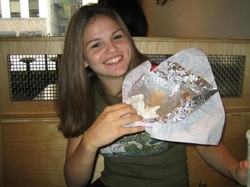
Don't be mistaken. They had lots of stuff when I was a kid. I'm a baby boomer. My parents survived the Depression and WWII and therefore had an endless license to talk about how they didn't have anything when they were kids. They're the ones who walked to school in the snow, in socks made out of newspaper and shoes made out of cardboard.
Now their generation is very old. They sit inside of houses that they bought in the sixties for twenty thousand dollars that are today worth eight hundred thousand dollars, instead of what my generation does, real estate wise, sit in houses we paid eight hundred thousand for and are now worth three hundred thousand. They get Medicare, Social Security and pensions, none of which the experts say my generation is going to receive. They love nothing better than complaining about how poor they are.
They still have the edge talking to today's kids, though. Grandma can tell them about chopping wood or hauling coal. She's good at it. You'd think she was raised next door to Abraham Lincoln, only her log cabin wasn't as gracious. She tells them about the day her family got their first refrigerator and their first telephone. When my kid asks her about my childhood, Grandma sniffs and says of me "He had everything."
That's not true. There are many things we didn't have in 1971 that we have in 2011, but Grandma's right. It's not about what we didn't have then. It's about what we had.
We didn't have cell phones. We had real phones. Telephones you could slam down in somebody's ear when you wanted to make a point without busting them into a handful of microchips. There's something about pressing the button on a cell phone when you hang up on a telemarketer that's not nearly as satisfying. Also, when you didn't answer your phone right away, people didn't think there was something wrong. They just figured you weren't home.
We didn't have video games, but we had the outdoors. Nobody knew about kidnappers or child molesters back then. I'm betting there were plenty of them, but they didn't get as much publicity in those days, so the Greatest Generation booted us out of the house with a clean conscience anytime it wasn't actually pouring rain. The outside temperature had nothing to do with it. That's what mittens were for. We just wore them and went out into howling winter wind to play, because that was lots more fun than listening to our parents tell us We didn't even have mittens when we were kids. If our hands were cold we had to wrap them in carpet remnants.
Everybody had from four to eleven or so kids anyway, so, while our parents never said anything out loud, you got the impression that if one or two got picked off it wasn't going to be a great big deal.
We didn't have terrorism. We had the Cold War. We learned that hiding under our desks was the best thing to do if the Russians attacked our elementary school, but we never had our safety scissors confiscated at the airport.
We didn't have cable TV, but we had a whole morning worth of TV devoted to us. Sure, kids have whole channels to themselves now, but that comes with a responsibility to watch them. Once Saturday morning became Saturday afternoon, we were free of TV. The fact that there are three or four kids' channels now shouldn't be taken as evidence TV is now more devoted to kids; they have channels for poker, real estate and cake-baking, too.
We didn't have Hulu, Tivo, DVD's or even VCR's. We had reruns. Not everything was better.
We didn't have chipotle, but we didn't have to figure out how to pronounce it, either. My mother still calls it "chip-pottle."
We didn't have a lot of fast food. We had sandwiches. In Philadelphia, where I grew up, we had cheesesteaks and hoagies. The fat guy who made them for you decided what to put on them. You could have ketchup on a cheesesteak if you wanted some. If you asked for mustard or mayo, the fat guy would say "You can't put that on a CHEESESTEAK," in a tone of voice that implied that putting miniature marshmallows on cat litter would taste better. If you insisted, he might just refuse and demand you leave his shop. If he made the cheesesteak the way you wanted it, he would wrap it in sandwich paper and shove it at you like it was a dirty diaper. The next time you came in, he would have someone else wait on you. The concept of little tubs of vegetables and condiments, from which the customer could freely choose the contents of his sandwich, as pioneered by the Subway chain, would have struck the fat guy as verging on the outermost limits of depraved insanity.
On the other hand, Subway sandwiches are utterly mediocre and Philly cheesesteaks rule. Which is good. The fat guy is no doubt dead by now (though certainly not of an overdose of mustard) and we don't need him turning over in his grave. Been enough earthquakes lately already.
 RSS Feed
RSS Feed











